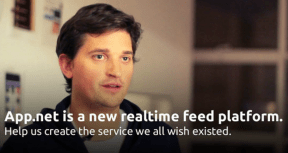After raising $500,000 to create an ad-free social platform for developers six weeks ago, Dalton Caldwell’s App.net has silently been courting developers to build apps that rely on its APIs. Now it’s giving them another reason to build on its platform by offering a financial incentive. In a blog post today, Caldwell announced that the company will begin rewarding developers with at least $20,000 a month, distributing funds based on user feedback about which apps are providing the most value to its users.
As part of the App.net Developer Incentive Program, the startup will send an email to users, asking them for information on whichever apps they used during the month. Using some basic algorithms, it will then use that feedback to determine which apps have been most useful, providing a score to app developers who are participating in the program. Beginning October 1, App.net has promised to distribute a minimum of $20,000 per month to app developers based on their scores in relation to the total score among those participating.
Not all App.net developers will be automatically eligible. Those interested in participating in the Incentive Program will have to apply and be accepted — and, of course, App.net will need stuff like payment and tax information to get folks signed up. That said, developers don’t have to participate if they don’t wish to. And if they want to try to make money through other means — like advertising or app sales — they’re welcome to do so.
As with all things App.net, the incentive program is an experiment, and Caldwell is remarkably frank about the fact that they’ll probably make mistakes as they go along. But while developers on other platforms are forced to find ways to monetize on their own, App.net is providing real incentives to build applications for its platform — especially early on, as there’s not a ton of competition.
The incentive program could attract the very same type of application that Twitter is trying to get rid of — that is, client apps that potentially compete with its native experience. In an email, Caldwell noted that there are already eight compatible App.net iOS apps, with at least twice as many in development. There are also three App.net apps on the Google Play store.
But App.net is also hoping that developers are more imaginative than that: Caldwell notes in his blog post that a great app “will be inventive, simple to use, focused, opinionated, and, above all, built with the needs of users in mind.”
